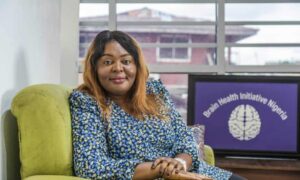
Early one Sunday morning in January 2020, Dr Temitope Farombi was told a woman in her 70s was in trouble and she needed to come quickly. Farombi, a consultant neurologist, found the woman lying topless in the street in Ibadan, Nigeria, surrounded by a group of 15 people beating her with sticks.
“They wanted her to confess to witchcraft,” says Farombi. “If she didn’t confess, they were going to beat her more.”
Farombi approached the mob and showed her ID card that said she was a doctor at Ibadan University College hospital. “I wasn’t scared, my only goal was to save the old woman from being lynched,” she says.
The woman, dishevelled and confused, had knocked on someone’s door demanding to be let in, Farombi learned. The owner of the house believed an evil spirit had come to visit and called the community for help.
Farombi suspected the woman was living with dementia. She explained that the woman was not a witch, and asked if anyone had ever come across an older person who wandered off and got lost. Many had. This was a symptom of a medical condition, she added. The crowd dispersed and Farombi attended to the woman.
Across Nigeria, and other countries in Africa, people living with dementia are often accused of witchcraft. Symptoms such as forgetting basic details and changes in behaviour are seen as evidence of evil. People have been set on fire, stoned, beaten to death and buried alive. Often it is disadvantaged and marginalised people in society, and mostly women, who are targeted.
It is impossible to know how many attacks occur, as most go unreported, but the UN estimates there were at least 20,000 victims of “harmful practices” across 60 countries between 2009 and 2019 – including children. Those targeted included people with albinism, disabilities and mental health problems. The UN human rights commissioner expects numbers to increase.
The African Union published guidance for parliamentarians on accusations of witchcraft last year, following the adoption in 2021 of a UN resolution on the elimination of harmful practices related to accusations of witchcraft.
The term “witchcraft” was introduced by European colonialists to refer to Indigenous beliefs and practices but has evolved over time with influences from Christianity, Islam and other religions. Accusations of witchcraft and subsequent attacks may result from the belief that the accused has caused, or may cause, harm using supernatural powers they allegedly possess.
In Nigeria, accusing someone of witchcraft is illegal, punishable by up to two years in prison. However, the law is rarely enforced, according to Leo Igwe, the founder of Advocacy for Alleged Witches. “People believe the conception of a witch is seen as something that should not be accommodated or protected by the law,” he says.
When Farombi went to the police after saving the woman who had been attacked, no action was taken. “The police don’t know such cases happen,” she says. “There’s no structure, no welfare system. They told us to take her wherever.”
